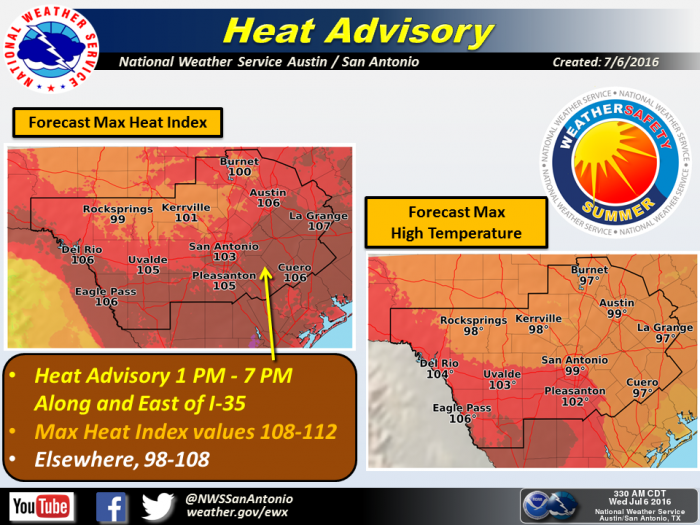Hot tamales! Heat advisory issued for Highland Lakes

Courtesy of National Weather Service Austin/San Antonio
BY ALEXANDRIA RANDOLPH/HIGHLAND LAKES NEWSPAPERS
Highland Lakes residents should keep their cool - a heat advisory was issued for the Highland Lakes area on Tuesday, and more hot weather is expected this week.
The National Weather Service Austin/San Antonio issued a heat advisory for Llano, Burnet, Williamson, Travis, and other Hill Country counties on Tuesday morning, July 5.
The advisory states temperatures will range from 98 to 105 degrees with heat indices of 108 to 112, especially between the hours of noon and 7 p.m.
“The combination of hot temperatures and high humidity will combine to create a situation in which heat illnesses are possible. Drink plenty of fluids, stay in an air-conditioned room, stay out of the sun and check up on relatives and neighbors,” the advisory read. “When possible, reschedule strenous activities to early morning or evening. Know the sings and symptoms of heat exhaustion and heat stroke. Wear light weight and loose fitting clothing when possible and drink plenty of water.”
The head advisory remained in effect until 7 p.m. Tuesday, but high temperatures are expected throughout the week.
NWS Meteorologists predict highs of 97 degrees with heat index values of 100 on Wednesday, a high of 98 on Thursday, and a high of 97 on Friday.
Know the signs
Heat exhaustion occurs when the body becomes very hot and begins to dehydrate through sweat. Symptoms of heat exhaustion include confusion, dark colored urine (a sign of dehydration), dizziness and fainting, fatigue, headache, muscle or abdominal cramps, nausea, vomiting and diarrhea.
A less common but more serious condition, heatstroke occurs when the body is no longer able to cool itself and core temperature becomes dangerously high. Symptoms of heat stroke can include a high body temperature (104 or higher), altered mental state or behavior, alteration in sweating, nausea and vomiting, flushed skin, rapid breathing, racing heart rate and headache. Emergency medical attention is needed to treat heat stroke.

